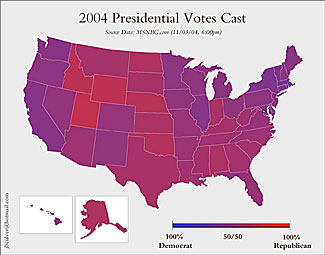Some things I was expecting that don’t seem to have turned up:
1) Whatever happened to the ‘October surprise’ that both parties were rumoured to be cooking up? (I don’t count “Bin Laden’s pre-election address”:http://blog.octobersurprise.net/ – it is hard to see which candidate it would favour). There is so much ideologically-led error and just plain sleaze around the Bush administration I was waiting to see if the Dems were holding back on some of it to use at the last minute but if there was a ‘smoking gun’ they didn’t use it. Neither did the Republicans try to pull anything major after the swift boat veterans garbage.
2) Where was the serious issue-led debate? Iraq dominated but most of the discussion about that was on the now out-of-date question of whether the war should have been started rather than looking seriously at how things should be done differently to end it successfully. Where was the discussion of a wider middle east peace process? I guess it’s probably too much to ask politicians in an election campaign these days to grapple with these issues however…
3) Why is it the press continued to obsess about minor scandals like the faked (?) bush war record memo, and horse race/process stories and largely failed to force the politicians to face issues like the the social security crisis, the budget deficit and the ongoing healthcare crisis? Jon Stewart of the excellent “Daily Show”:http://www.comedycentral.com/tv_shows/thedailyshowwithjonstewart/ seems to be one of the few high profile figures to complain about this but why do we need to rely on comedians to tell us democracy is in trouble?
update: I just listened to “this realaudio report”:http://www.thislife.org/ra/276hitt.ram from NPR’s “This American Life”:http://www.thislife.org/ about how senior Republicans have been caught blatantly trying to make sure Democrats don’t get registered to vote. (Democrats have done this too but it appears not to the same extent). Why didn’t we hear more about this stuff?
4) Where were the much-vaunted weblogs? It seems to me that they played a very similar role to that of the mainstream media – concentrating on minutiae, the process and the occaisional whacky conspiracy theory and completely failing to engage with the bigger picture. Admittedly most webloggers are normally not going to have the time to investigate issues like health care in depth but what they could do is draw journalist’s attention to the valuable work of academics and think tanks and even more importantly attempt to provide some of the colorful first person accounts of where things are going wrong with the US that might spur both journalists and the wider public to action. As far as I could tell political weblogs were just ways for activists and policy wonks to talk among themselves during this election (and to raise money).
To tell the truth these impressions are off the top of my head and not based on any kind of rigorous research. I don’t spend my day reading the American political weblogs or even watching American news (I mostly listen to NPR streamed online and even that was pretty poor!) but I would hope that if the media and the blogosphere had been doing a good job of serving democracy during this election I would have heard more about it. If you disagree with me and you can come up with some more positive examples I would love to hear about them.
Meanwhile if you’re American and in America don’t forget to vote (and please vote Kerry)!

